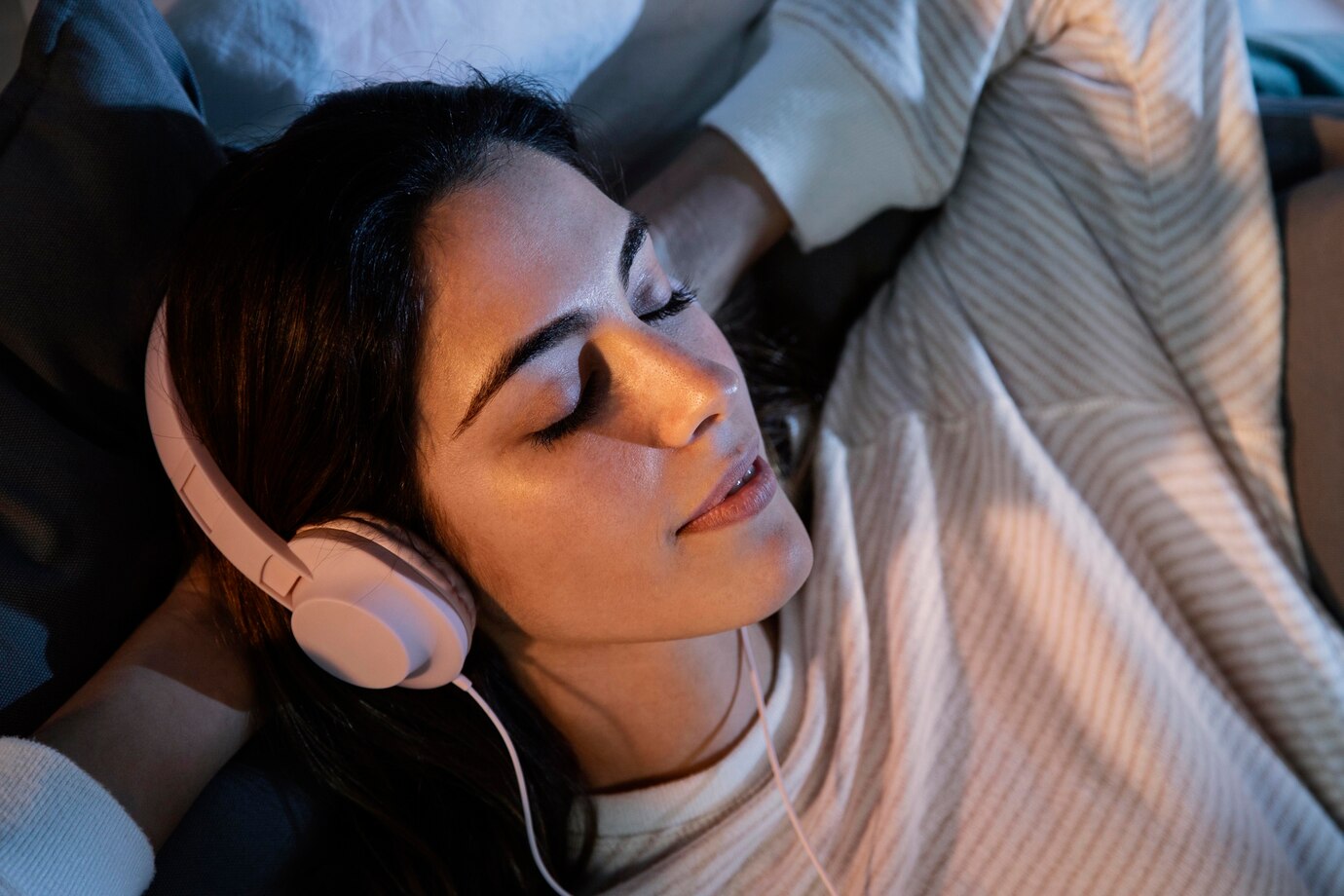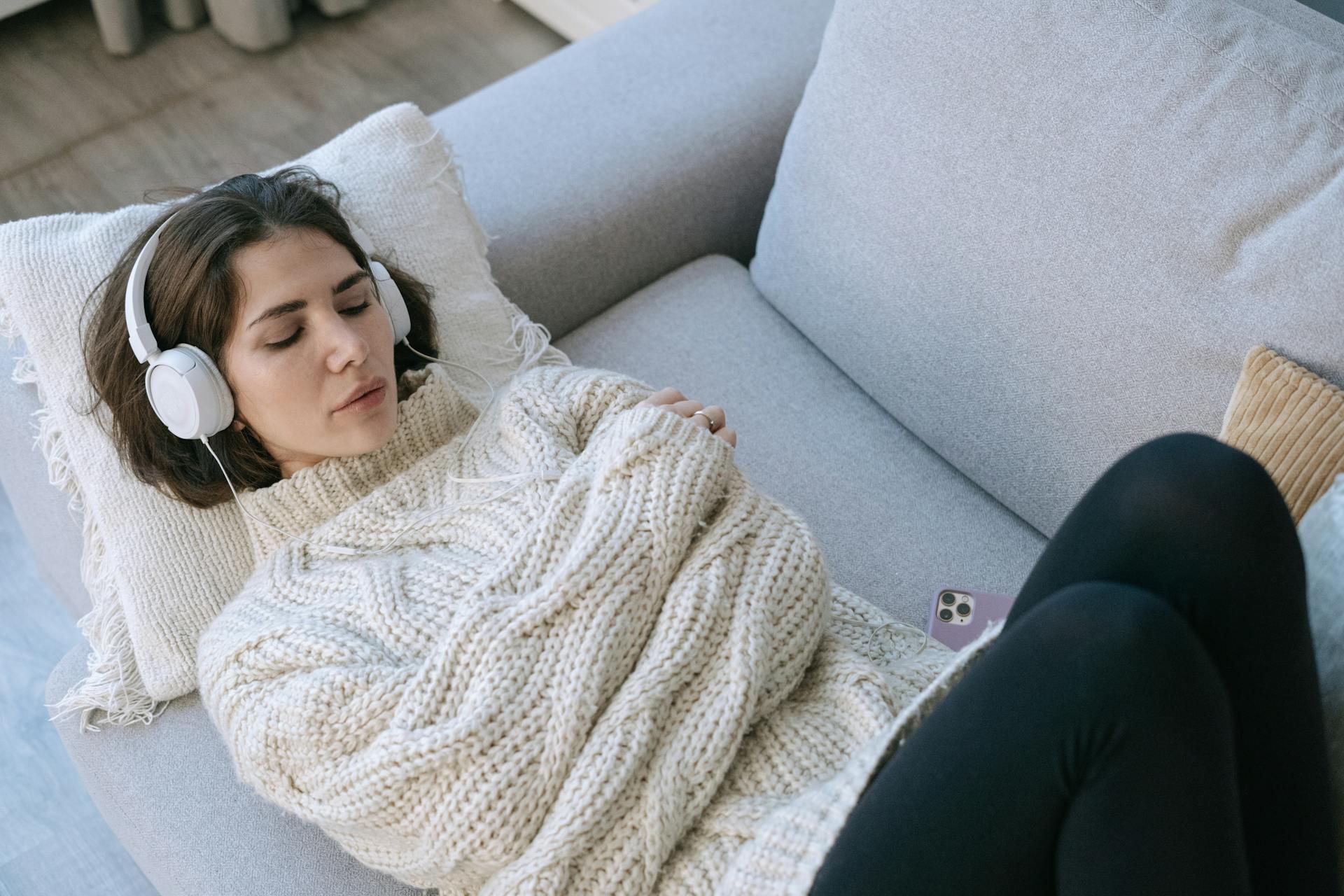Sleep is as crucial to our health as eating, drinking, and breathing. Integrating relaxing music into our bedtime routine can transform how we prepare for sleep and enhance the overall quality of our rest. At our core, we understand the challenges many face when trying to wind down after a long day. This is why we advocate for the use of soothing melodies that not only help quiet the mind but also set the stage for a deeper and more restful sleep.
Relaxing music has specific qualities that significantly impact our relaxation process by slowing the heart rate, lowering blood pressure, and reducing levels of stress hormones. These elements collectively create an ideal atmosphere for sleep. By weaving gentle, calming sounds into the moments leading up to bedtime, we establish a sanctuary of peace that beckons a more soothing sleep experience.
Additionally, the consistent use of calming tunes at night can help signal to our body that it’s time to transition from the day’s busyness into the night’s restfulness. This practice aids in reinforcing our natural circadian rhythms, enhancing our overall sleep cycle. Let’s explore how relaxing music can become an integral part of achieving better sleep, ensuring we wake up refreshed and ready to meet the challenges of a new day.
Understanding How Relaxing Music Affects Sleep Quality
The impact of relaxing music on sleep is both profound and beneficial. It’s fascinating how a simple melody can alter our mind’s state and lead us into a deeper, more restorative sleep. When we listen to relaxing music at bedtime, its soothing rhythms and harmonies work to slow our heart rates, lower our blood pressure, and calm our nervous systems. This physiological response is crucial for initiating the body’s natural sleep processes, making the transition from wakefulness to sleep smoother and quicker.
Research has shown that the tempo of music plays a vital role in this process. Specifically, songs with a rhythm of about 60 beats per minute can synchronize with the alpha waves in our brain. These alpha waves help reduce anxiety and are present during the brain’s relaxed yet awake state, just before sleep. Integrating music with a similar tempo into our bedtime routine can significantly enhance the quality of our sleep, allowing us to wake up feeling more refreshed and alert.
Key Components of Relaxing Music for Better Sleep
To maximize the benefits of relaxing music for sleep, it’s important to know what elements to look for. Here are several key components that make music effective for sleeping:
- Slow Tempo: Music with a slow rhythm is ideal, as it can help synchronize the heart rate with brain waves conducive to sleep.
- Lower Pitch: Music with low, mellow pitches tends to be more soothing than higher pitches, which can potentially increase alertness.
- Smooth Rhythm: Rather than complex, erratic rhythms that may excite the mind, choose tunes that have a smooth, persistent rhythm.
- No Loud Variations: A sudden change in volume or tempo can interrupt the relaxation process. Opt for tracks that maintain consistency.
- Instrumental: Lyrics can stimulate the brain’s language centers and disrupt relaxation, so instrumental music is typically more effective for inducing sleep.
By focusing on these components, we can select music that isn’t just calming but is also scientifically proven to facilitate a better night’s sleep. This understanding enables us to use music not as mere background noise, but as a therapeutic tool to enhance our nightly rest.
Simple Ways to Incorporate Relaxing Music into Your Nighttime Routine
Implementing relaxing music into your nighttime routine is easier than you might think, and it can be highly effective in improving your sleep quality. Start by setting up a dedicated playlist that features tracks specifically chosen for their calming properties. We often suggest scheduling this music to begin playing about 30 minutes before you plan to sleep. This helps create a peaceful atmosphere and signals to your body that it’s time to wind down.
Another method is to use a low-volume, ambient music player that can be timed to shut off after you’ve likely fallen asleep. If you find that silence is too stark after the music stops, consider a sound machine that continues making soft, nondescript noises like whispers of wind or a distant ocean. These background sounds help maintain a tranquil sleeping environment throughout the night, further enhancing the depth and quality of your rest.
Evaluating the Effects: What Research Says About Music and Sleep
Various studies underline the effectiveness of using music for better sleep, giving us insight into how we can optimize our relaxation practices. Research consistently shows that participants who listen to calming music before bed report faster sleep onset times and improved sleep quality compared to when they don’t use music. Moreover, the effects are not just psychological; physiological measurements indicate lower respiratory rates and reduced heart rates among those who listen to soothing tunes at bedtime.
These findings are crucial as they guide us in fine-tuning our approach toward incorporating music into our sleep routines. They affirm that not all music is the same—what works for one person’s sleep improvement might not work for another. Hence, it’s crucial to choose compositions that align well with personal preferences and the specific calming criteria that research supports.
Conclusion
At Prayer Pray, we are committed to helping you find peace and relaxation through the power of music. Our specially curated selections are designed to guide you into a deeper, more healing sleep every night. Whether you are struggling with occasional sleep disruptions or looking for ways to enhance your nightly rest, our music offers a natural, soothing remedy that aligns with the gentle rhythms of peace and serenity.
We invite you to explore the transformative influence of relaxing violin music on your sleep practices and overall well-being. Visit us at Prayer Pray and allow us to enrich your life with soothing sounds and melodies that foster joy, love, and a restful night’s sleep.




